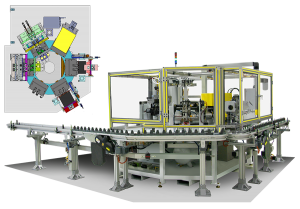Cincinnati Test Systems (CTS) manufactures a variety of pressure decay leak test systems that are engineered to accommodate specialized leak testing applications. This unique transmission flow valve test system is a prime example—it delivers accurate and efficient leak testing, with an indexing dial configuration that allows for throughput of up to 600 parts per hour.
At Station 3, parts receive P-port reverse check valve flow testing. This test ensures that the check valve is functioning properly to prevent backflow. Once in position, test tooling advances to automatically seal the part and close the spool valve for pressure testing. Test air is supplied at port B, while ports A and T are dead-headed and port P monitors for leakage. This test also ensures that all parts are present. Test pressure is 14.7 psig (1 bar), monitored at 500 Hz sampling. At Station 4, parts receive forward flow P-port sweep testing to ensure the valve provides proper flow. Once the part is in position, tooling advances to automatically seal the part, with ports P, T, and A+B sealed independently. Port P is pressurized, ports A and B are dead-headed, and port T measures flow. This test monitors pressure, force, position, and flow to create a flow curve at various spool positions from fully open to closed. Test pressure is again 14.7 psig, with sealing recorded at 500 Hz sampling. Parts that pass both tests are laser marked for product identification at Station 5. At Station 6, a pick-and-place unloader transfers the marked flow valves from the system to pallets on the unload conveyor; rejected parts are delivered to the reject conveyor and removed from the leak test systems. The indexing dial allows the system to test two parts every 12 seconds, for a total of 600 parts per hour.


